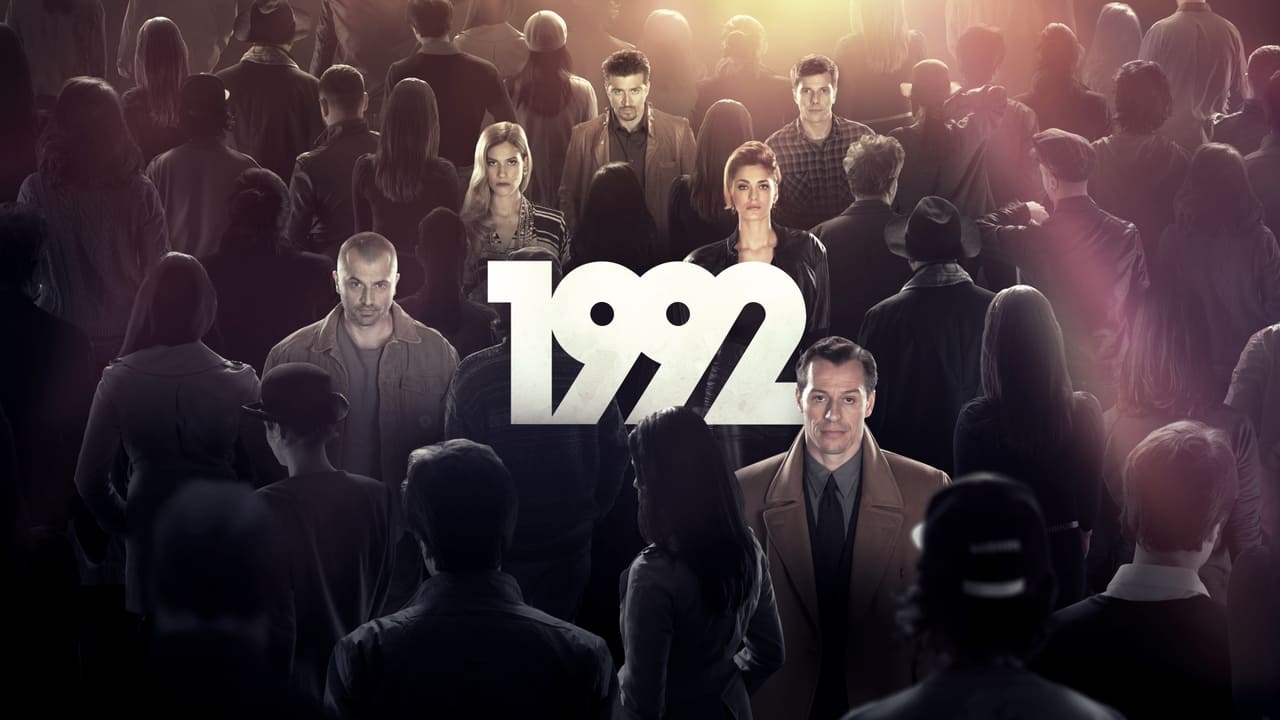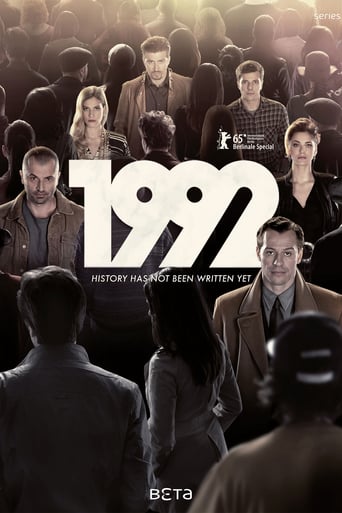Diagonaldi
Very well executed
Konterr
Brilliant and touching
Robert Joyner
The plot isn't so bad, but the pace of storytelling is too slow which makes people bored. Certain moments are so obvious and unnecessary for the main plot. I would've fast-forwarded those moments if it was an online streaming. The ending looks like implying a sequel, not sure if this movie will get one
Sienna-Rose Mclaughlin
The movie really just wants to entertain people.
Ladiloque Boh
Here we have a wonderfully written and produced historical fiction based on events occurring in Italy (mainly) during the '90ies (this is meant to be the first season covering the year 1992). It's a pity I didn't watch it 2 years ago when it was originally released: 2 years is a lot of things watched meanwhile and I might have enjoyed it even more.In 1992 I was 13 like the protagonist's daughter. Possibly I remember much more of that year, its vibe, people's bafflement and reactions, than most non-historians adults. Then, various cultural dynamics heavily fighting unlawful conducts matured and gained power; peculiar loathing was raised by the standard corruptive practices in politics. This resulted in a period of political instability (or irrelevance?) that hasn't actually ended yet (but that's debatable). Perhaps the major effect was the influence on the new generations' perspective: more disillusioned, and - if not more honest - at least less dumb. And still victims of yet other fairy tales: the show business, liberalism and various forms of populism.While in today's connected world these events might seem unimportant, they represented an overwhelming wake-up call for the people of one of the major economies of the planet (like Italy was in the 90ies). And portrayed in this fashion they truly shine. Many lines, scenes and acting moments are brilliant in their gritty cynicism, evocative glamour or punching irony.Nonetheless we have a volatile screenplay as well: mostly it's incredibly vivid but throughout the series we have also a bit too many in-depth romantic relationships, anguish-squeezing drama and trite situations. Above all: too many tight links among the fictitious/historic protagonists. They meet and influence the core story-line; then they leave each other; then they meet again and change the story again. And this happens multiple times for all the main characters: a bit too much to be believable. Writers could have given some space to other actors without generating the natural skepticism that occurs when "history worthy" things happen but no real history book talks about our fictional protagonists: is it likely?A couple of things nearly kept me from giving the series a full 9 (i.e. like Tea Falco's delivery, Accorsi's "too cool" character, or a populist congressman and a starlet having public-sex in central Rome: a little too much beyond belief...) but overall it's just nitpicking (and actually Accorsi carries every scene he's in).International appeal is a possible concern though: the story-line is very complex, with a lot of different real-life people involved about whom you can hardly find anything online which is not in Italian. So any attempt to give substance and depth to what non-Italian audiences are watching might easily fail. And this could ultimately result in a parade of politicians, bureaucrats, businessmen, etc etc you don't know and care about.Given this caveat, 1992 is surely one of the best recent historic-drama series worldwide; so good it could well be used to entertain and still inspire bored high-schoolers towards serious history research.
colinebc
I didn't expect this quality.Some made a comparison with House of cards or Mad men.I couldn't disagree more.I think this show is far BETTER than those ones.First, it does not fall into the usual traps of Us series like Damages or House of Cards, who tend to develop far too complicated plots. Of course 1992 tells a complex story with dozens of different characters, but the plot is not over complicated and remains terribly realistic. I am starting to be reeeeeally fed up with those plots with countless twists and turns, with presumably good persons who turn out to be horrible and vice-versa, and then the opposite, and so on, until a point where you don't understand anything and, worse, you don't see the point in watching the program anymore.1992 has not this default. The 10-episodes finally appear to be ONE, consistent story, not so complicated in the end.Second, specific attention has been drawn to ALL the characters. They could definitely exist in real life. Not only the main characters, but also the secondary ones (the politicians like Nobile, the Judge Di Pietro, Notte's daughter, etc.), and this is stunning.Third, many different universes are depicted. Where most of the traditional TV shows tend to focus on ONE, determined universe, the authors of 1992 have decided to juxtapose at least 3 different worlds : politics, justice, and advertising. This is amazingly well done. Each of these universes is depicted with a different atmosphere and a specific attention. In particular, the politic world is fantastically depicted (the national assembly, the way the parliament members impose discipline on the party sections, the lobbying, the electoral campaign, and so on). I couldn't remember any TV show or movie showing so many details of the "political cookery".The dialogues reflect the specificity of each of these worlds, which is, also, impressing. Because you do not speak the same way in the parliament or in the office of the general attorney. And they are often very funny, too.Fourth, the plot has a meaning. I mean, of course, the first priority is to watch a TV show with an exciting plot (and it is), good dialogues (and they definitely are) and characters. But this show gives more. It offers a certain vision of human societies (could have been the same story in ancient Rome, or almost). And when a good story offers a vision, I call it literature. Good literature!
macsargasso
The mother of all inventions sometimes seem to origin from Italy. Fotball, food, wine and women and some other modernity. But this telenovela is very good indeed it melts down the brute tone of harsh reality from series as Gomorrah and others and succeed to be just a slight truly romantic at the same time it explains what happened around and after 1992 in Italy with its effects on Europe as a whole. I like this and enjoyed every minute of the actors from Tea Falco who is good at being annoying spoiled brat who takes on her family business and to Miriam Leone beautiful and fantastic as the prototype for Italian women in show-biz. the whole cast is doing a fantastic job and the male characters are worth prizing. This is good and i hope they make more seasons it really deserves it.
Luca Tramarin
Note: this review is exclusively based on the first season (the only one currently released).The first 10 episodes of "1992" tell the political changes that struck Italy after the investigation of "Mani Pulite" conducted by magistrate (now politician) Antonio Di Pietro. Despite the true historical background, the main characters of the series are all fictional, as well as their stories; however, the adventures of the protagonists are able to portray the social and political scenery of those years. Sometimes the narration flows into a romanticized sentimentalism typical of the worst Italian fiction, but these moments tend to be irrelevant to the enjoyability of the final product. From a technical point of view, the direction of Giuseppe Gagliardi is in several occasions worth mentioning; the screenplay cleverly alternates the affairs of the characters; the soundtrack was chosen with great care and is never misplaced; the actors (especially the former Miss Italy Miriam Leone) are all convincing, except perhaps a mono-expressive and irritating Tea Falco. To sum up, "1992" is a well-made series, intriguing and engaging, but slightly below other Sky's productions (like, for example, "Romanzo Criminale").

